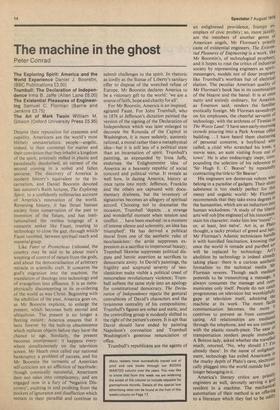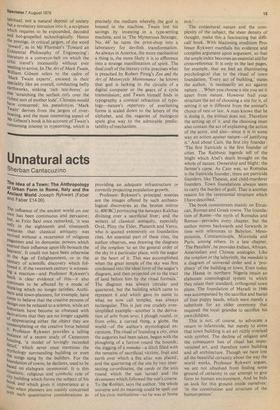The machine in the ghost
Peter Conrad
The Exploring Spirit: America and the World Experience Daniel J. Boorstin, (BBC Publications £3.50) Trumbull: The Declaration of Independence Irma B. Jaffe (Allen Lane £6.00) The Existential Pleasures of Engineering Samuel C. Florman (Barrie and Jenkins £3.75) The Art of Mark Twain William M. Gibson (Oxford University Press £5.95)
Despite their reputation for crassness and cupidity, Americans are the world's most blithely unmaterialistic people—angelic, indeed, in their contempt for matter and their conviction that they inhabit a kingdom of the spirit, pristinely reified in plastic and paradisially deodorised, an earnest of the second coming in a soiled and fallen universe. The discovery of America is modern history's equivalent to the incarnation, and Daniel Boorstin devoted last autumn's Reith lectures, The Exploring Spirit, to a confidently millenarian account of America's renovation of the world. Reversing history, it has thrust human society from conservation of the past to invention of the future, and has institutionalised the restless longings of a romantic seeker like Faust, trusting to technology to close the gap, through which' Faust tumbled, between spiritual reach and material grasp.
Like Faust or Prometheus Unbound, the country may be said to be about man's wresting of control of nature from the gods, and about the democratisation of arbitrary miracle in scientific craft. It concerns the god's migration into the machine, the translation of theology into technology and of evangelism into affluence. It is as metaphysically disconcerting in its re-ordering of the world as was Christ. Beginning with the abolition of the past, America goes on, as Mr Boorstin explains, to enlarge the present, which becomes both eternal and ubiquitous The present is no longer a fleeting instant : America ensures that it lasts forever by the built-in obsolescence which replaces objects before they have the chance to age. Similarly, the present becomes omnipresent : it happens everywhere simultaneously on the television screen. Mr Heath once called our national bankruptcy a problem* of success, and for Mr Boorstin the torments of American self-criticism are an affliction of beatitude: though cosmically successful, Americans dare not relax into complacency, and are engaged now in a fury of 'Negative Discovery', exulting in and profiting from the pockets of ignorance and disaffection which remain in their paradise and continue to
submit challenges to the spirit. In rhetoric as lordly as the Statue of Liberty's sanitary offer to dispose of the wretched refuse of Europe, Mr Boorstin declares America to be a visionary gift to the world: 'we are a source of faith, hope and charity for all'.
For Mr Boorstin, America is an inspired, agitated Faust. For John Trumbull, who in 1876 at Jefferson's dictation painted the version of the signing of the Declaration of Independence which was later enlarged to decorate the Rotunda of the Capitol in Washington, it is more sedately, austerely rational, a moral rather than a metaphysical idea—but it is still less of a political state than an incarnation of spirit. Trumbull's painting, as expounded by Irma Jaffe, enshrines the Enlightenment idea of America as a heavenly republic of social concord and political virtue. It reveals as well how, in dazing America, history at once turns into myth: Jefferson, Franklin and the others are captured with documentary drabness, but the inventory of signatories becomes an allegory of spiritual accord. Choosing not to dramatise the occasion, Trumbull 'depicts.. . a strange and wonderful moment when tension and conflict.. . have been resolved: in a moment of intense silence and solemnity, an idea has triumphed'. He has derived a political moral from one of the aesthetic rules of neoclassicism: the artist suppresses expression as a sacrifice to impersonal beauty; Trumbull likewise suppresses political dispute and heroic assertion as sacrifices to democratic amity. In David's paintings, the frigidity and scuptural severity of neoclassicism make visible a political creed of remorseless revolutionary violence; Trumbull softens the same style into an apology for constitutional democracy. The Declaration of Independence rejects the gestural convulsions of David's characters and the tyrannous centrality of his compositions; Trumbull's figures are sober and static, and the controlling group is modestly shifted to the right of the picture's centre. It is apt that David should have ended by painting Napoleon's coronation and Trumbull Washington's generous renunciation of office.
Trumbull's republicans are the agents of
an enlightened providence, frumpy exemplars of civic probity; so, more jazzily, are the members of another genus of American angels, Mr Florman's priestly caste of existential engineers. The Existential Pleasures of Engineering is a work, like Mr Boorstin's, of technological prophecy. and it hopes to rout the critics of industrial society by representing engineers as spirit' messengers, models not of dour proprietY like Trumbull's worthies but of electric& elation. The peculiar American quality Of Mr Florman's book lies in its combination of the bizarre and the banal. It is at onoe nutty and entirely ordinary, for America, as Emerson said, renders the familiar exotically foreign. Mr Florman eavesdroPs on his employees, the cheerful servants of technology, with the archness of Tiresias ifl The Waste Land: 'I have seen early-morning crowds pouring into a Park Avenue office building. .. I have heard them chattering of personal concerns, a boyfriend who called, a child who scratched his knee, a movie seen, an aunt visiting from out of town'. He is also endearingly inept, cosipounding the solecism of his reference to 'Sir Hugh E. C. Beaver' by repeatedlY contracting the title to 'Sir Beaver'.
His engineers are dexterous robots wh° belong in a paradise of gadgets. Their shirt)/ substance is too sleekly perfect for this messy and organic world: Mr Florman recommends that they take extra degrees In the humanities, which are an induction into human wickedness. 'A study of the liberal arts will rob [the engineer] of his innocence' stain his character, make him less 'moral -or, at least, less naïve'. Art is, as Plato thought, a tacky product of greed and lust, Mr Florman's Adamic technicians handle it with horrified fascination, knowing that once the world is remade and purified ar,t will be replaced by technology. Art s abolition by technology is indeed alreaelY taking place: there is a curious aesthetic formalism to the technical media Mr Florman reveres. Though each medimn pretends to be transmitting a message, It always consumes the message and Well: municates only itself. People do not catc° programmes on television but worshipfullY gape at television itself, admiring the machine at its work. The more facil.e communication becomes, the more !I contrives to prevent us from common': eating. All relationships are mediate° through the telephone, and we are intirnaref, with the plastic mouth-piece. The ease.° transportation renders people immobile: A Boston lady, asked whether she travelled much, retorted, 'No, why should I.? already there'. In the name ofenlighten,' ment, technology has exiled Americans ir the murky depth of Plato's cave, electro cally plugged into the world outside but n° longer belonging in it. America's literary critics are priestlYd engineers as well, devoutly serving a g° resident in a machine. The mechani.cat automatism of their method is an offering to a literature which they feel to be oddlY Spiritual, not a natural deposit of society but a revelatory intrusion into it, a scripture Which requires to be expounded, decoded and hot-gospelled technologically. Hence the prestige, in critical jargon, of the word toward', as in Mr Florman's 'Toward an Existential Philosophy of Engineering': literature is a conveyor-belt on which the critic travel's incessantly without ever needing to arrive. In The Art of Mark Twain, ,William Gibson refers to the cadre of Mark Twain experts', encased in their sPeciality like an overall, conducting hefty earthworks, sinking 'rich test-bores' or else 'scratching the surface only over the richest sort of mother lode'. Clemens would have concurred: his pseudonym 'Mark Twain derives from the jargon of riverboating, and the most interesting aspect of Mr Gibson's book is his account of Twain's consuming interest in typesetting, which is precisely the medium whereby the god is housed in the machine. Twain lost his savings by investing in a type-setting machine, and in 'The Mysterious Stranger, No. 44' he turns the print-shop into a laboratory for devilish transformation. As always in America, the more mechanical a thing is, the more likely it is to effloresce into a strange manifestation of spirit. The dual craft of the literary critic practises what is preached by Robert Pirsig's Zen and the Art of Motorcycle Maintenance: he knows that god is lurking in the circuits of a digital computer or the gears of a cycle transmission; and Twain himself finds in typography a comical refraction of typology—nature's repertory of everlasting forms is scaled down to the letters of the alphabet, and the vagaries of biological spirit give way to the admirable predictability of mechanism.



























 Previous page
Previous page